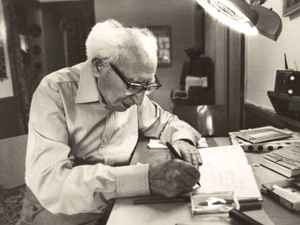|
סלינו
על כתפינו
|
Our Baskets on Our Shoulders |
Saleinu Al K’tfeynu Words: Levin Kipnis Melody: Yedidyah Admon |
|
סלינו על כתפינו,
|
|
Our baskets on our shoulders, From Judea and Bang the drum, play the
flute! We chose
praiseworthy fruit. Figs and Apples Bang the drum, play the
flute! Bang the drum, play the
flute! |
|
|
|
|
Written by two of the most
prolific of Israeli song-writing Duos, Saleinu Al Katfeinu is a Shavuot standard. The song uses biblical terms and references
to evoke the procession to Jerusalem to present the Bikkurim, the first
fruits of the season, which were brought in baskets and laid down at the altar
of the Temple. Upon doing so, the person
making the offering would turn to the priest and recite the passage from Deuteronomy
best known as the core of the Haggadah: “My father was a wandering
Aramean.” The full version of that text
is a statement about the bringing of the first fuits.
Biblical terms are plentiful in this song.
“Panu Derech” is a term found in
prophetic writings, including Isaiah 40:3: ‘קוֹל
קוֹרֵא--בַּמִּדְבָּר, פַּנּוּ דֶּרֶךְ ה . 3 Hark! one calls:
'Clear in the wilderness the way of the LORD, make plain in the desert a travel-way
for our God.” Most of the major
regions of the land are named, as are
most agricultural efforts, including both the grain field שדה and the produce field (melon or cucumbers, usually) משקה. The chorus mentions
both drum and flute, common instruments in Psalms and the rest of Tanach.
The words were by Levin Kipnis (
17 August 1894 – 20 June 1990). Kipnis
was a prolific children’s author,
and a winner of the Yetziv,
Lamdan and Israel Prizes . He remained active as a writer until his death in
1990.
The music is by his regular song-writing
partner, Yedidia Admon (12/05/1894 -
04/02/1982). One of Admon’s most famous melodies is “Betzeyt Yisrael”, sung during numerous hallels and seders.
A "Sound of Music" rendition:
SO CUTE!!!!!!!!!: https://www.youtube.com/watch?v=4kSwDWNEvkk
Adults sing it too:
An Israeli fusion version:
http://www.youtube.com/watch?v=DebqEYjWxi4
How Braille Put Jewish Texts at My Fingertips | Reform Judaism
The JBI Library, for the blind, visually impaired, and reading disabled
Hebrew Seminary - A Rabbinical School for Deaf & Hearing
About Gallaudet | World Leader in Deaf Education
Hillel at Gallaudet University – Enriching Jewish life at Gallaudet University (gallaudethillel.org)



No comments:
Post a Comment